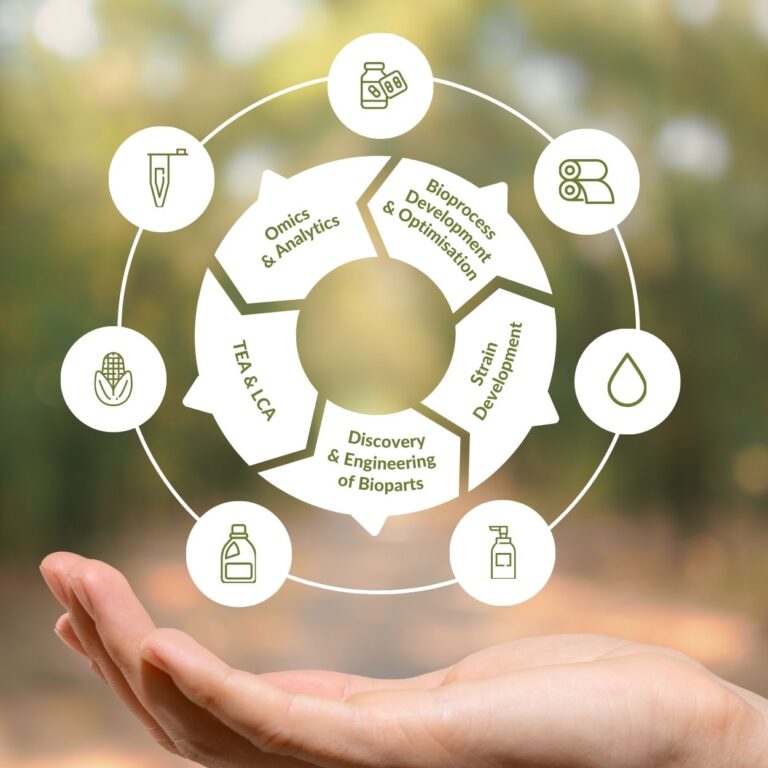One-Stop-Shop: A Common Service Interface
The IBISBA One-Stop-Shop constitutes a single-entry point to access to a wide range of services offered by cutting-edge research facilities across Europe. Materialised by a web portal and catalogue, our One-Stop-Shop offers IBISBA coordinated business functions to provide users fast-track access to modular services that can be assembled into client-specific project workflows, while minimising business transactions between service providers and shortening research timelines.
A Systematic Approach for End-to-End Bioprocess Development

IBISBA adopts a systemic approach to bioprocess development, integrating disciplinary expertise and targeting technical specifications right from start. IBISBA acts as a super hub, bringing capabilities and platforms together. Within this framework, microorganisms and bioprocesses are designed in tandem, ensuring optimal biocatalyst performance and process adaptation to deliver quality products.
Researchers follow a DBTL-P cycle, an extension of the DBTL cycle used in synthetic biology. This cycle encompasses the design and construction of the entire process, from upstream to downstream operations. Iterative DBTL-P cycles are conducted at increasingly large scales until a bioprocess prototype is ready for uptake.
Interoperable Services
The IBISBA headquarters fosters interoperability, providing training on common business standards and shared tools to overcome hurdles inherent in multi-partner organisations. IBISBA is constantly improving a unique method called “service modularisation,” which defines service modules, the building blocks of R&D service workflows to improve collaboration between research facilities. These service descriptors provide interfaces between service modules, allowing IBISBA research facilities to operate better together. Our services have proven interoperability from TRL 2 to 7.
By promoting bidirectional knowledge exchange between different bioprocess development phases within an interoperable ecosystem, IBISBA accelerates R&D and ensures translation of knowledge into concepts, prototypes, and pre-industrial bioprocess.

How are Intellectual Property Rights (IPR) managed?
Responding to both open science and commercial needs, IBISBA IPR policy flexibly shares IP assets when desired or protect them when necessary for user competitiveness.

Collaborative R&D projects
Research facilities own Background and Improvement IPR, while Foreground IPR ownership depends on contract type, with fair access and exploitation conditions agreed upon by IBISBA partners.
Data Management
Project data stored on our free and open knowledge asset registry called IBISBAkHub offer customisable access levels, adhering to FAIR international guidelines and supporting Europe’s Open Science policy.

Key Results
IBISBA performed a design study, subsidising on-site and virtual access to its research facilities for a selected number of industrial biotechnology professionals from EU Members States, Associated and Third Countries. Over five calls for proposals, 59 projects were received from 24 countries including 16 Member States. Our subsidised access programme facilitated accessibility to capital intensive European RIs while demonstrating the feasibility of IBISBA full DBTP-P cycle for the execution of collaborative R&D projects.
29
Projects Granted
16
Multi-facility Services Provided
17
Countries Represented
Experience the heartbeat of
Biotechnology Innovation
Join 1000+ professionals who receive the trendiest news about industrial biotechnology, collaboration opportunities, and upcoming events.
By signing up to our quarterly newsletter, you agree to our Privacy Policy
